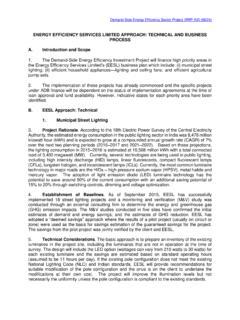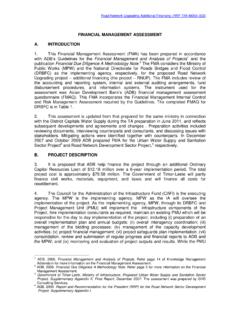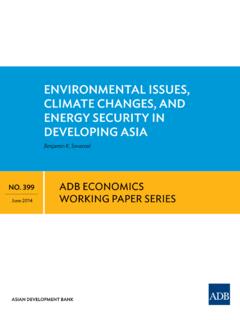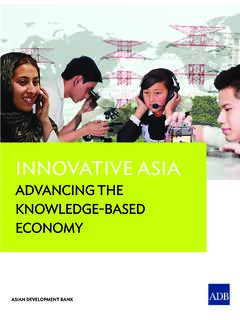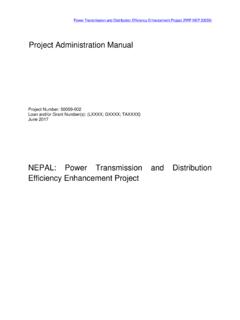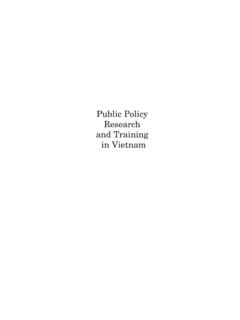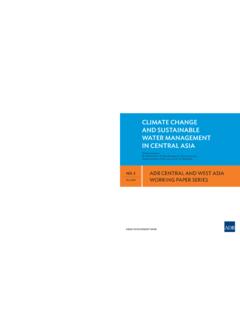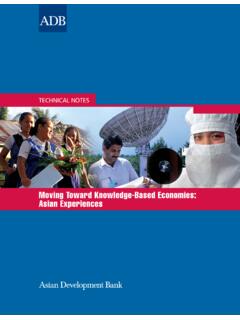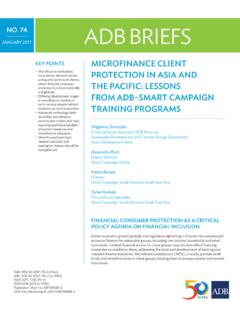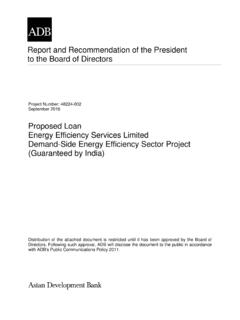Transcription of Asia Water Forum 2022: Guidelines on Submission of ...
1 Guidelines on Submission of Abstracts for Presentation Individuals who wish to deliver a presentation at the Asia Water Forum 2022 (AWF 2022) should submit an abstract using the online Submission form by 31 March 2022 following the Guidelines below. Background AWF 2022 will be centered around the theme of resilient and Water secure Asia and Pacific'. Underpinned by the need for climate change resilience, sustainable Water management, reliable Water services, and Water security, participants can expect high-level plenary sessions and parallel break-out sessions centered around four key focus areas: (i) Water as a sustainable resource; (ii) universal Water and sanitation services; (iii) productive Water in agriculture and the economy; and (iv) climate change and Water -related risks.
2 Topics will also cover the following crosscutting themes of: (i) embracing environmental sustainability and circular economy; (ii) improving governance and catalyzing finance; (iii) promoting inclusiveness and gender equality; (iv). building resilience and adaptive capacity; and (v) fostering innovation and technological advancement. Objective AWF 2022 provides a platform and venue for sharing knowledge and experience on Water information, innovation, and technology across the region. AWF 2022 aims to discuss ways to identify and adopt innovations that best address the requirements for a resilient and Water -secure Asia and the Pacific, and to keep the profile of Water high on the region's development agenda.
3 The increased knowledge and application of international best practices as well as continued technology development are expected to improve the effectiveness and sustainability of ADB-financed projects in developing member countries; thus improving climate change resilience, management of Water , delivery of Water and sanitation services, and status of Water security across the region. Proposed presentations should comply with the following: Topics: Presentations should align with the overall theme and address topic(s) identified in these Guidelines Content: Presentations should share research relevant to the proposed event theme and topic(s), and/or describe an innovative approach, tool or solution which aims to address a Water security- related challenge in the Asia Pacific region.
4 Case Study: It is encouraged that presentations include details of one or more practical and case studies. Languages: Proposals and papers must be submitted in English. Format: The final presentation should be 15 minutes in length and will be delivered using a PowerPoint presentation using the event template. Presentations will be considered ADB knowledge products, and ADB will seek to make them publicly available through its various distribution channels including its website. Authors and/or organizations giving presentations will be asked to give permission for such use. The focus of the presentation should be on the presentation and sharing of knowledge relevant to the event theme and topic(s), rather than on the organization's commercial product and services.
5 AWF 2022 - Guidelines on Submission of Abstracts for Presentation |2. Session Topics The table below outlines proposed technical session topics for the AWF 2022. Presentations may also be proposed on topics that are relevant to the five cross-cutting event themes under its four focus areas, but that have not been specifically identified in the table below (however topics identified in the table below may be given priority). Proposed Technical Session Topics Water as a sustainable resource River basin perspectives - breaking down silos - promoting OneWater' approaches' to Water resources management; source to sea and rural-urban linkages; ecosystem approaches (terrestrial/aquatic), understanding the linkages between livelihoods, aquatic ecosystems, and river flow regimes; reversing the Water quality, pollution impacts of rapid economic growth and solid waste management; improving resource management to achieve the SDGs; promoting MAR, wetlands and sustainable groundwater management practices.
6 Adaptation-focused and risk-based approaches in Water resources management River basin decision-making - balancing Water use among sectors and increasing Water productivity; over abstraction of surface & ground Water and sustainable levels of abstraction; multiple-use dams/reservoirs Water sector governance - weak compliance and enforcement systems / mechanisms for improved Water sector governance, and sustainable and resilient management; transboundary cooperation - regional cooperation platforms as an opportunity for engagement (CAREC and the Yangtze River Economic Belt; Partnerships, North- South and South-South learning).
7 Digitalization, hydromet networks, space-based technologies and tools Policies - market-based instruments; ecosystem services; promote Water conservation and demand side management; introduce the circular economy and nature-based solutions Universal Water and sanitation services wastewater recycling and reuse - market for by-products; energy and resources recovery Serving the underserved - informal urban settlement service provision, management models, poor-inclusive service delivery; customer-centric approaches Digital technologies for improved Water and wastewater management and service delivery (non-revenue Water management; asset optimization; improved customer services).
8 Filling the financing gap - innovative approaches to the design of Water supply and wastewater tariffs, taxes and subsidies; crowing in private sector investment COVID-19 response - public health coordination, disease surveillance and Water quality monitoring by health agencies and utilities, wastewater -based epidemiology, pandemic planning and disaster response wastewater treatment impact on river and ocean health - focus on microplastics and capture of toxic compounds impacting ocean health; co- treatment and management of solid- and liquid waste Productive Water in agriculture and the economy Successful application of management tools and methods for efficient production - managing irrigation for higher productivity and more effective management tools and methods (climate-smart irrigation approaches, technologies for planning and operational management, green house technology).
9 Financial models for economic Water use - irrigation management, other productive Water uses; innovative irrigation financing approaches (getting additional benefits, , generation of micro-hydropower), costs transparency, cost recovery, PPPs, private investments (financing Water harvesting, soil improvement, costs and financing staple crop production for food security - land consolidation and contract farming). protecting the environment while achieving economic Water use - climate change, production, crop selection, agri-chemical pollution (case of cotton industries); re-use of treated Water , combining irrigation and fertigation within a landscape approach Effective irrigation services and for high irrigation performance - institutions, concessions, services fees, asset management Conserving resources; circular economies for Water , food and energy security - decreasing pumping costs, decreasing fertilizer energy inputs, re-use of Water ( , full Water cycle approach of beverage companies.)
10 Greenhouse technologies). AWF 2022 - Guidelines on Submission of Abstracts for Presentation |3. Climate change and Water -related risks Emerging technologies for better managing Water and climate risks Managing Water and climate related risks in urban and rural contexts, examples and good practices Risk communication: methods and tools Understanding and catalyzing risk financing Compound and cascading risk effects Managing risks through nature-based solutions Private sector role and experience on managing climate risks Submission process 1. Please express your interest in delivering a presentation using the online form or pdf version of the abstract Submission form to by Monday, 31 March 2022.
